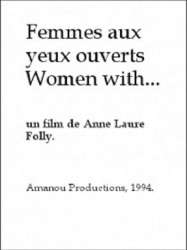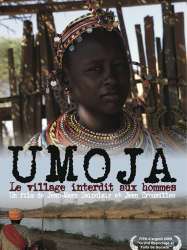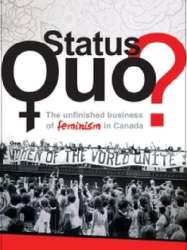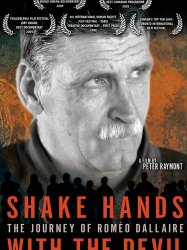Women with Eyes Open is a film of genre Documentary directed by Anne-Laure Folly
Women with Eyes Open (1994)

If you like this film, let us know!
Femmes aux yeux ouverts (Women with eyes open) is a Togolese documentary film directed by Anne-Laure Folly. It covers the lives of contemporary African women in Burkina Faso, Mali, Senegal and Benin.
Comments
Leave comment :
Suggestions of similar film to Women with Eyes Open
There are 2 films with the same director, 8870 with the same cinematographic genres, 8789 films with the same themes (including 10 films with the same 3 themes than Women with Eyes Open), to have finally 70 suggestions of similar films.If you liked Women with Eyes Open, you will probably like those similar films :

Women with Eyes Open (1994)
, 53minutesDirected by Anne-Laure Folly
Genres Documentary
Themes Films set in Africa, Feminist films, Political films
 , 52minutes
, 52minutesGenres Documentary
Themes Films set in Africa, Feminist films, Politique, Documentary films about law, Documentaire sur une personnalité, Political films
Ce documentaire raconte l'histoire d'un village kényan, Umoja. Pendant près de 30 ans, des centaines de femmes vivant à Umoja disent avoir été violées par des soldats britanniques dans le nord du Kenya. Accusées d'avoir apporté la honte sur leur communauté, elles se font battre et répudier par leur maris. Une poignée d'entre elles créent Umoja, un village interdit aux hommes qui devient le refuge des femmes samburu. Des hommes jaloux attaquent régulièrement le village et posent des problèmes à sa fondatrice Rebecca Lolosoli.

Mère-Bi (2008)
, 55minutesOrigin Senegal
Genres Documentary
Themes Films set in Africa, Films about writers, Feminist films, Films about journalists, Politique, Documentaire sur une personnalité, Documentary films about politics, Political films
Née à Sokone en 1926, Annette Mbaye d’Erneville, la mère du réalisateur William Mbaye, fut la première journaliste du Sénégal. Elle s’est très tôt sentie concernée par le développement de son pays. Militante de la première heure pour la cause de l'émancipation des femmes, elle est à la fois une pionnière et une anti conformiste. Elle a partagé sa vie entre la France, où elle a étudié, et le Sénégal, où elle est retournée en 1957, pressentant que le temps de l’Indépendance était arrivé.
 , 1h27
, 1h27Origin Canada
Genres Documentary
Themes Feminist films, Documentary films about law, Documentaire sur une personnalité, Documentary films about politics, Political films
Rating62%





The documentary combines archival material with contemporary stories, juxtaposing scenes from the 1967 Royal Commission on the Status of Women with the 2nd Pan-Canadian Young Feminist Gathering in 2011 in Winnipeg, organized by the rebELLEs movement. It explores the progress made on concerns raised 45 years ago: universal childcare, violence against women and abortion access.

Budrus (2010)
, 1h10Directed by Julia Bacha
Origin USA
Genres Documentary
Themes Films set in Africa, Films about religion, Documentary films about law, Documentary films about war, Documentary films about historical events, Documentaire sur une personnalité, Documentary films about politics, Documentary films about religion, Political films, Films about Jews and Judaism
Rating76%





Jordana Horn in The Jewish Daily Forward states that: Budrus [is] a documentary by Julia Bacha that examines one West Bank town’s reaction to Israel’s construction of the security barrier. The town, with a population of 1,500, was set to be divided and encircled by the barrier, losing 300 acres of land and 3,000 olive trees. These trees were not only critical for economic survival but also sacred to the town’s intergenerational history. The film tells the story of Ayed Morrar, a Palestinian whose work for Fatah had led to five detentions in Israeli jails, but whose momentous strategic decision that the barrier would be best opposed by nonviolent resistance had far-reaching ramifications.

Full Circle (1992)
, 56minutesOrigin Canada
Genres Documentary
Themes Feminist films, Documentaire sur une personnalité, Political films
Rating31%






Male Domination (2009)
, 1h43Directed by Patric Jean
Origin France
Genres Documentary
Themes Feminist films, Politique, Political films
Rating65%





Peut-on croire qu’au XXIème siècle, des hommes exigent le retour aux valeurs ancestrales du patriarcat : les femmes à la cuisine et les hommes au pouvoir ? Peut-on imaginer que des jeunes femmes instruites recherchent un « compagnon dominant » ? Que penser d’hommes qui subissent une opération d’allongement du pénis, « comme on achète une grosse voiture » ? Si ces tendances peuvent de prime abord sembler marginales, le film nous démontre que nos attitudes collent rarement à nos discours. L’illusion de l’égalité cache un abîme d’injustices quotidiennes que nous ne voulons plus voir. Et où chacun joue un rôle.

Neighbors (2009)
, 1h45Directed by Tahani Rached
Origin Egypte
Genres Documentary
Themes Films set in Africa, Documentary films about politics, Political films
Built at the dawn of the 20th century, the neighborhood of Garden City was a small residential area bordering on downtown Cairo, Egypt, where international political leaders had their residences. Giran walks us through this neighborhood as it is nowadays. Abandoned mansions, luxurious salons, embassies, shops or rooftops, where a whole family lives. The houses and their occupants, witnesses of the changes in History, tell tales of break-ups, hopes and survival.
 , 1h31
, 1h31Directed by Peter Raymont
Origin Canada
Genres Documentary
Themes Films set in Africa, Films about racism, Documentary films about racism, Documentary films about law, Documentary films about war, Documentary films about historical events, Documentaire sur une personnalité, Documentary films about politics, Political films
Rating80%





Between April and June 1994, an estimated 800,000 Rwandans were killed in 100 days. Most of the dead were Tutsis by the hands of the Hutus. The genocide began when Rwandan president Juvenal Habyarimana's plane was shot down above Kigali airport on April 6, 1994.
 Connection
Connection